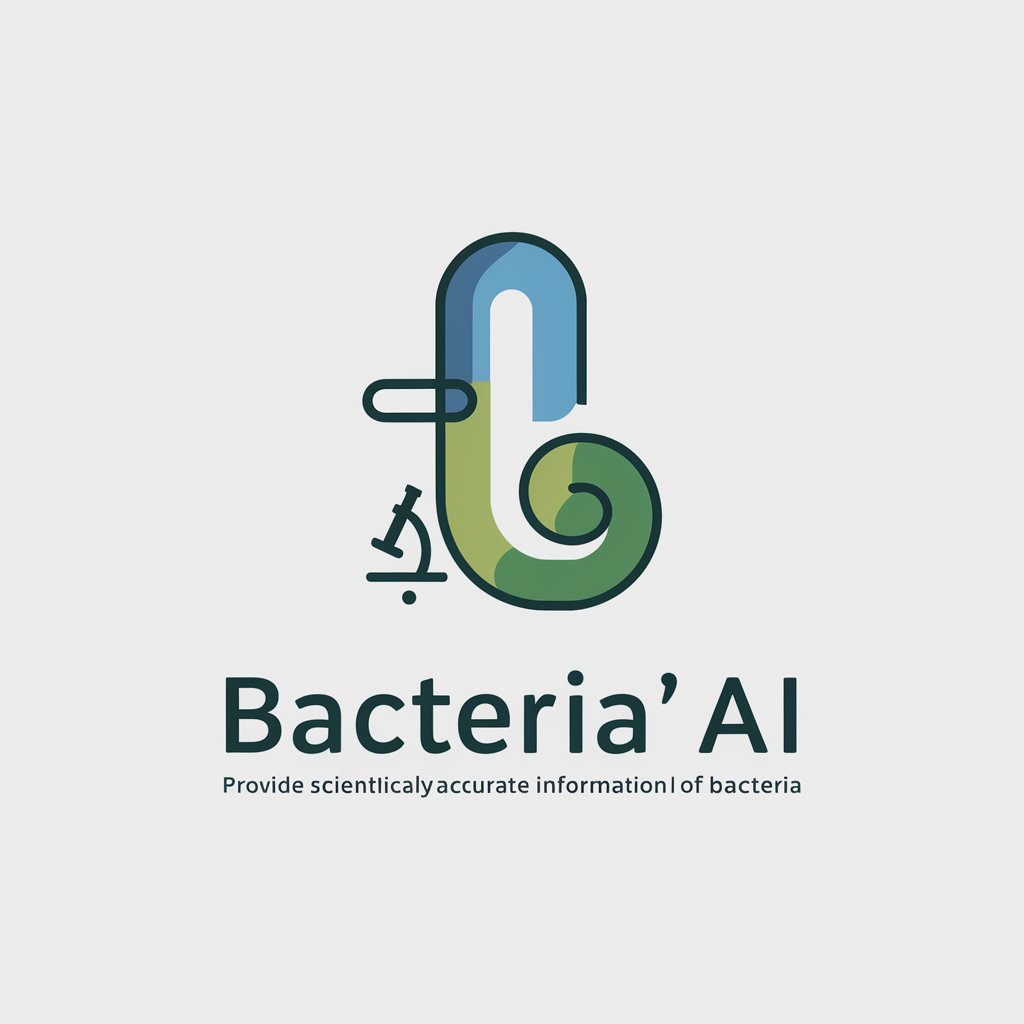Bacteria - Bacterial Insight Tool

Hello! I'm here to help you explore the fascinating world of bacteria.
Deciphering bacteria with AI precision
Explain the role of beneficial bacteria in human health.
What are the characteristics of antibiotic-resistant bacteria?
How do bacteria contribute to environmental sustainability?
Discuss the applications of bacteria in biotechnology.
Get Embed Code
Introduction to Bacteria
Bacteria are a vast group of single-celled, prokaryotic microorganisms that thrive in diverse environments, from soil and water to the extreme conditions of hot springs and radioactive waste. They play crucial roles in the biosphere, involved in processes such as nutrient cycling, photosynthesis, and the decomposition of organic materials. Bacteria are designed with remarkable versatility and adaptability, featuring a simple yet efficient cellular structure that lacks a true nucleus and organelles. Their genetic material is typically contained in a single, circular DNA molecule, and many bacteria also possess plasmids—small, extra-chromosomal DNA fragments that can carry genes beneficial for survival, such as antibiotic resistance. An example of bacteria's role can be seen in the nitrogen cycle, where nitrogen-fixing bacteria convert atmospheric nitrogen into forms usable by plants, while other species are involved in nitrification and denitrification, maintaining ecosystem balance. Powered by ChatGPT-4o。

Main Functions of Bacteria
Nutrient Cycling
Example
Nitrogen-fixing bacteria such as Rhizobium
Scenario
These bacteria form symbiotic relationships with leguminous plants, converting atmospheric nitrogen into ammonia, thereby enriching soil fertility and supporting agriculture.
Bioremediation
Example
Oil-degrading bacteria like Pseudomonas
Scenario
Utilized in cleaning up oil spills through bioremediation, these bacteria break down petroleum into less harmful substances, mitigating environmental damage.
Health and Disease
Example
Lactobacillus species
Scenario
Used in the production of yogurt and as probiotics, Lactobacillus bacteria help maintain gut health and can prevent gastrointestinal infections.
Biotechnology
Example
Escherichia coli
Scenario
Genetically engineered E. coli are used in the production of insulin and other pharmaceuticals, showcasing bacteria's role in modern medicine and biotechnology.
Ideal Users of Bacteria Services
Environmental Scientists and Engineers
Professionals involved in environmental management and sustainability would benefit from understanding and utilizing bacteria for bioremediation, waste treatment, and pollution control.
Healthcare Professionals
Medical and health experts can leverage beneficial bacteria in treating and preventing infections, developing new antibiotics, and understanding the microbiome's impact on health.
Agriculturalists
Farmers and agronomists utilize nitrogen-fixing and phosphate-solubilizing bacteria to enhance soil fertility and crop production, reducing the need for chemical fertilizers.
Biotechnologists
Scientists in biotechnology exploit bacteria for genetic engineering, pharmaceuticals production, and the synthesis of biofuels, contributing to advances in healthcare and sustainable energy.

Guidelines for Utilizing Bacteria
1
Start by exploring Bacteria without commitments: Visit yeschat.ai to enjoy a no-login, free trial, bypassing the need for ChatGPT Plus.
2
Identify your need or interest area, such as academic research, environmental studies, or health and disease, to tailor the tool's capabilities to your specific requirements.
3
Engage with Bacteria by inputting your queries or data related to bacterial studies, antibiotic resistance, or biotechnology applications for precise and scientifically accurate responses.
4
Utilize the feedback mechanism to refine your queries for more tailored responses, enhancing your understanding or research with each interaction.
5
Explore the tool's suggestions for further reading or related topics to expand your knowledge and application in the field of microbiology.
Try other advanced and practical GPTs
TaskMaster
Empower Your Projects with AI

Productivity Pal
Elevate Your Productivity with AI

Acoustic Sound Expert
Elevate Your Space with AI-Powered Acoustic Solutions

Budismo rehegua
AI-Powered Guide to Buddhist Wisdom

Zebra Headquarters Hunter
Automating Corporate Address Discovery

Humanizador de Textos
Bringing authenticity to AI-powered writing.

SEO for Restaurant
Optimize your restaurant's online presence with AI-driven SEO.

Adventure Dreamweaver
Crafting Enchanting Tales with AI

Promo Crafter
Elevate Your Casino's Appeal with AI-Powered Promos

RandonCity
Craft detailed cities with AI power.

God
Exploring Divinity with AI

Code Wizard
Empowering Your Code with AI

Detailed Q&A on Bacteria
What roles do bacteria play in human health?
Bacteria are crucial for human health, serving both beneficial and harmful roles. They are essential in the gut microbiome for digesting food, synthesizing vitamins, and protecting against pathogens. However, pathogenic bacteria can cause diseases, underscoring the importance of understanding bacterial functions and maintaining a healthy microbial balance.
How can bacteria be used in biotechnology?
In biotechnology, bacteria are used for producing pharmaceuticals, such as insulin; degrading pollutants in bioremediation processes; and in genetic engineering for the production of novel compounds. Their rapid growth and the ease of manipulating their genetic material make them ideal for various biotechnological applications.
What is antibiotic resistance, and why is it a concern?
Antibiotic resistance occurs when bacteria evolve mechanisms to withstand the effects of antibiotics. This is a growing concern because it leads to the development of 'superbugs' that are resistant to multiple antibiotics, making infections harder to treat and increasing the risk of disease spread, morbidity, and mortality.
How do probiotics work, and what are their benefits?
Probiotics are live bacteria that confer health benefits when consumed in adequate amounts. They work by enhancing the gut microbiota's diversity, competing with pathogens, and modulating the immune system. Benefits include improved digestion, enhanced immune function, and a reduced risk of certain diseases.
Can bacteria be engineered to fight pollution?
Yes, bacteria can be genetically engineered to degrade pollutants, a process known as bioremediation. These bacteria can break down hazardous substances into less harmful products, offering an environmentally friendly solution to pollution. This approach is used in cleaning oil spills, industrial waste, and contaminated soil and water.
